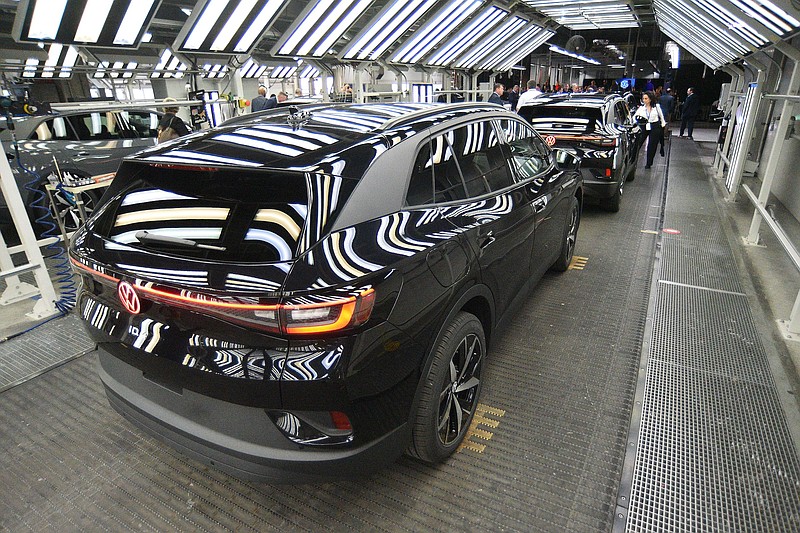Flush with $88 million in new federal money, Tennessee is driving into an electric vehicle future that includes helping ease range anxiety of motorists who travel between urban areas, according to officials.
The state has crafted a plan to use grants and public-private partnerships to install fast-charging EV stations off interstate highways at locations not more than 50 miles apart, said Andrea Noel, a planning supervisor for the Tennessee Department of Transportation.
"The federal government is saying, 'We're really going electric,'" she told a Tennessee Automotive Manufacturers Association conference meeting in Chattanooga last week. "This is the time for electric vehicles."
Noel said the money is part of funding coming from President Joe Biden's $1 trillion infrastructure bill that was signed into law late last year. The bill will funnel billions of dollars to states and local governments to upgrade outdated roads, bridges and transit systems, including EV infrastructure.
"We'll put them in rural areas," the TDOT official said about the fast chargers. "The earliest we'll see some of these on the ground is probably a year."
CoPilot, a car shopping app, reported in a new study this month that there's plenty of room for Tennessee to grow its fast-charging network. While the nation has 21,782 DC fast chargers, there are only 234 in the Volunteer State, according to CoPilot.
Fast chargers add 100 to 200 miles of range per 30 minutes of charging. But this category only represents 21.1% of all chargers nationally, the CoPilot study showed. Nearly four in five chargers in the U.S. currently are Level 2 chargers. Those units add about 25 miles of range per hour of charging, according to CoPilot, noting that rate is seen as acceptable for charging near home or at the office but slow for anyone taking a longer trip.
Noel said the $88 million in new federal money is to be spent in Tennessee over five years. While some of the funds are targeted at the initiative to install chargers for battery-powered vehicles, other money will focus on different EV efforts yet to be defined, the official said.
She said other uses could involve workforce training at Chattanooga State Community College to help people learn how to maintain the EV chargers. The federal money comes with a stipulation that the chargers are kept at a 98% operability level, Noel said.
Also, the state is working on a pad that operates like a cellphone charger that a motorist just drives over, she said.
Or, Noel said, the state could put the charging stations 25 miles apart if it chooses.
She said the state won't duplicate an effort the Tennessee Valley Authority has started to install fast chargers within its seven-state service area.
Drew Frye, a TVA program manager, told the group that the utility has a goal of seeing 200,000 EVs by 2028, and there are only about 30,000 operating in its service area now. Still, the 2028 goals would represent just 2% of vehicles on the road, he said.
Frye said the 200,000 electric vehicles would cut 1 million metric tons of carbon dioxide each year.
Also, he said, $120 million annually would stay in the region by buying electricity for the EVs rather than purchasing gasoline made elsewhere. Meanwhile, $200 million would come in savings to consumers not having to buy gas, Frye said.
"The benefits add up very, very quickly," he said. Frye said that predictions show that TVA's service territory could hold about 1 million EVs by 2035.
He said TVA is helping build what he termed a foundational charging network. Early in 2021, TVA, Chattanooga's EPB and other local power companies pledged to aid in a $20 million initiative to build fast-charging stations across the state over the next three to five years.
Frye said the aim is to spark private companies to invest in a charging network.
"TVA does not want to operate ... charging stations," he said. "We want a thriving private market."
Elizabeth Hammitt, who directs residential energy and environmental solutions for EPB, said while much of EV charging takes place in the home, it's important to have public stations.
Renters will need convenient and efficient ways to charge their vehicles, she said.
"We don't necessarily have the answers right now," Hammitt said. "They don't have garages. How are we going to make sure they are part of the transition?"
She said that most EVs in Tennessee are concentrated in the state's urban centers. Most chargers are put in by dealerships, hotels, shopping centers, offices and government, Hammitt said.
She said there has been an exponential climb in EV adoption and chargers since 2020, though the number of battery-powered vehicles is still small compared to overall registered cars, trucks and SUVs.
Still, Hammitt said, the electric utility industry will be able to handle the higher power loads due to EVs because the transition will happen gradually.
Contact Mike Pare at mpare@timesfreepress.com or 423-757-6318. Follow him on Twitter @MikePareTFP.
